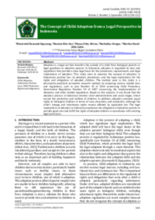Adoption is a legal act that transfers the custody of a child from biological parents or legal guardians to adoptive parents. In Indonesia, adoption is regulated by laws and regulations that provide a clear legal basis for the procedures, requirements, and legal implications of adoption. This study aims to examine the concept of adoption in Indonesian positive law, its adoption procedures, and the legal implications for the rights and obligations of adopted children. The method used in this study is a descriptive-analytical normative research method, by analyzing various related laws and regulations, such as Law Number 35 of 2014 concerning Child Protection, Government Regulation Number 54 of 2007 concerning the Implementation of Adoption, and other related regulations. Based on this analysis, it was found that the adoption process in Indonesia involves strict administrative and social stages, which ensure the protection and welfare of children. In addition, adoption provides equal rights to biological children in terms of care, education, and protection, although the child's lineage and inheritance rights remain affected by applicable law. The legal implications of adoption in Indonesia emphasize the obligations of adoptive parents to provide good care and fulfill the rights of adopted children in accordance with existing legal provisions.

